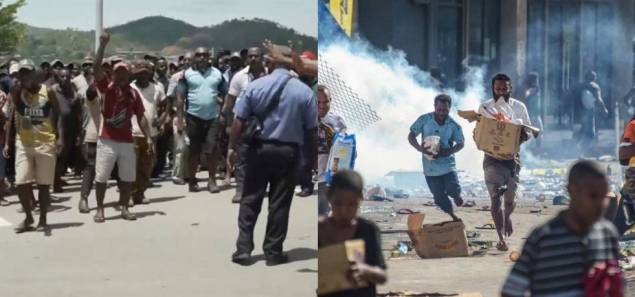There is now a state of emergency in the city of Papua New Guinea because at least 15 people were killed in riots.
PM James Marape said on Thursday that more than 1,000 troops are ready to “step in wherever necessary.”
Police went on strike on Wednesday over a pay cut that the government says was an error. Stores and cars were set on fire, and groceries were stolen.
The unrest comes after the Pacific Island nation was already under a lot of stress because of high unemployment and rising prices.
In a speech to the whole country, Mr. Marape said, “Breaking the law does not get certain results.” He said that Port Moresby would be in a state of emergency for 14 days.
Even though most of the fighting had stopped by Wednesday evening, when soldiers were sent in and cops went back to work, the prime minister said that things were “still tense.”
The Port Moresby General Hospital stated that eight people had died in the capital, Port Moresby. Another seven people were said to have died in Lae, which is PNG’s second-largest city.
Locals told the BBC that the lack of cops made people from the outskirts of the capital more likely to break into shops and cause other damage.
A report from Reuters says that National Capital District Governor Powes Parkop said in a radio speech on Wednesday, “We have seen an unprecedented level of strife in our city—something that has never happened before in the history of our city and our country.”
He said that “opportunists” were mostly responsible for the theft. It was also said that police protesters had done some violent things.
Police and other government workers went on strike outside of parliament on Wednesday because they found that their pay had been cut by up to 50% in their most recent paychecks. This led to the unrest.
In reaction, Mr. Marape said that the pay cut was an error caused by a computer glitch that took up to $100 (£78) out of the pay checks of government workers. He said that the mistake would be fixed in the funds for next month.
Many protesters didn’t agree with this answer, though, and some of them tried to break into the parliament building. Video footage shows people setting fire to a car outside the prime minister’s property and breaking through a gate.
A lot of people pointed to posts on social media that said the government was raising taxes on income, which the government rejected.
According to the New York Times, Mr. Marape said, “Social media picked up on this wrong information, misinformation.” He also said that people had taken advantage of the fact that cops were not around.
Maholopa Laveil, who lives in Port Moresby, told the BBC that thieves had broken into the city and stolen cars and set many buildings and small shopping centers on fire. The most violent times were during the day.
“We had a lot of fear for people who were working in the shopping centres and offices – there was a lot of glee and excitement from the people who were attacking and entering the shops,” he shared.
Professor of economics at the University of Papua New Guinea, Mr. Laveil, also said that most of the people who were stealing seemed to be from the poorer areas outside of the city.
“They came on when they heard the police had stopped patrolling the city.”
These are the suburbs. There are a lot of poor people who don’t have jobs and cause a lot of crime and disorder in the city. Many have been hurt a lot by not having jobs, which has caused inflation, and a lot of them came out to try to get what they could from the stores closest to them, he said.
Ambulance workers said they had treated several people who had been shot, and the US embassy said there had been shots near its building.
The Chinese embassy has also told the PNG government that two Chinese people were hurt and several Chinese shops were attacked.
“The Chinese Embassy in Papua New Guinea has lodged solemn representations with the Papua New Guinea side over the attacks on the Chinese shops,” the embassy stated on WeChat.
The prime minister is under more pressure and public anger from many groups because his country’s economy is in bad shape and unemployment and inflation rates are high.
The opposition has also been working on a motion to remove Mr. Marape from office, which will happen in February.
“Households are doing it tough, there’s growing inequality within urban centres particularly the capital city and we’ve got a growing number of settlements and high crime rates,” Laveil said.
“All of those factors contributed to a perfect storm.”
What do you say about this story? Visit Parhlo World For more.


